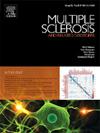History of head trauma and the risk of multiple sclerosis: A systematic review and meta-analysis
IF 2.9
3区 医学
Q2 CLINICAL NEUROLOGY
引用次数: 0
Abstract
Background
Multiple sclerosis (MS) is a chronic disease of the central nervous system with unclear etiology involving genetic, environmental, and immunological factors. The potential link between head trauma and MS is controversial, with conflicting evidence. This systematic review and meta-analysis aim to assess the risk of developing MS following head trauma.
Methods
A systematic search of electronic databases was conducted, including studies that investigated the risk of MS in individuals with a history of head trauma compared to those without. Observational studies, including cohort and case-control designs, were included. Data synthesis was conducted using RevMan software. GRADE was used to assess the certainty of evidence.
Results
Fifteen studies comprising 1,619,640 participants were included in the meta-analysis. The overall odds of developing MS were significantly higher in the head trauma group compared to the control group (OR = 1.41;95 % CI = [1.23, 1.61]; P < 0.00001; I2 = 62 %). Sensitivity analyses based on the number of participants and quality further supported our results. Subgroup analysis showed that results remained consistent across different head trauma identification methods (P = 0.92), early age head trauma and head trauma defined as TBI, or concussion were also significant predictors of MS (P < 0.0001). Analysis of the number of hits suggested a dose-response relationship between the number of head injuries and the risk of MS. According to the GRADE, all outcomes were classified as low or very low certainty of the evidence.
Conclusion
This meta-analysis suggests that a history of head trauma may be associated with an increased risk of developing MS. Further research is warranted to support our findings and explore the mechanisms linking head trauma to MS.
头部外伤史与多发性硬化症的风险:系统回顾与荟萃分析
背景多发性硬化症(MS)是一种中枢神经系统慢性疾病,病因不明,涉及遗传、环境和免疫因素。头部创伤与多发性硬化症之间的潜在联系存在争议,证据相互矛盾。本系统综述和荟萃分析旨在评估头部创伤后患多发性硬化症的风险。方法对电子数据库进行了系统检索,包括调查有头部创伤史者与无头部创伤史者患多发性硬化症风险的研究。其中包括队列和病例对照设计的观察性研究。使用RevMan软件进行数据综合。结果荟萃分析纳入了15项研究,共有1,619,640人参与。与对照组相比,头部外伤组患多发性硬化症的总几率明显较高(OR = 1.41;95 % CI = [1.23, 1.61]; P < 0.00001; I2 = 62 %)。基于参与人数和质量的敏感性分析进一步支持了我们的结果。亚组分析表明,不同的头部外伤鉴定方法结果保持一致(P = 0.92),早期头部外伤和被定义为创伤性脑损伤或脑震荡的头部外伤也是多发性硬化症的重要预测因素(P < 0.0001)。对撞击次数的分析表明,头部受伤次数与 MS 风险之间存在剂量反应关系。根据 GRADE,所有结果均被归类为证据确定性较低或非常低。为了支持我们的研究结果并探索头部外伤与多发性硬化症的关联机制,有必要开展进一步的研究。
本文章由计算机程序翻译,如有差异,请以英文原文为准。
求助全文
约1分钟内获得全文
求助全文
来源期刊

Multiple sclerosis and related disorders
CLINICAL NEUROLOGY-
CiteScore
5.80
自引率
20.00%
发文量
814
审稿时长
66 days
期刊介绍:
Multiple Sclerosis is an area of ever expanding research and escalating publications. Multiple Sclerosis and Related Disorders is a wide ranging international journal supported by key researchers from all neuroscience domains that focus on MS and associated disease of the central nervous system. The primary aim of this new journal is the rapid publication of high quality original research in the field. Important secondary aims will be timely updates and editorials on important scientific and clinical care advances, controversies in the field, and invited opinion articles from current thought leaders on topical issues. One section of the journal will focus on teaching, written to enhance the practice of community and academic neurologists involved in the care of MS patients. Summaries of key articles written for a lay audience will be provided as an on-line resource.
A team of four chief editors is supported by leading section editors who will commission and appraise original and review articles concerning: clinical neurology, neuroimaging, neuropathology, neuroepidemiology, therapeutics, genetics / transcriptomics, experimental models, neuroimmunology, biomarkers, neuropsychology, neurorehabilitation, measurement scales, teaching, neuroethics and lay communication.
 求助内容:
求助内容: 应助结果提醒方式:
应助结果提醒方式:


